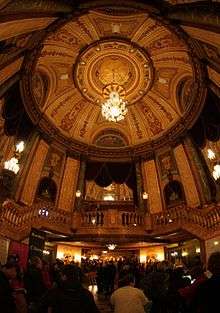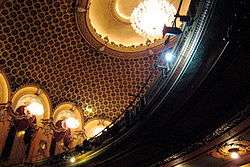State Theatre (Sydney)
The State Theatre is a heritage-listed theatre, located in Market Street, in the city centre of Sydney, Australia. It hosts film screenings, live theatre and musical performances, and since 1974 it has been the home of the annual Sydney Film Festival.
Description and history

Located in Market Street on the site former offices of the Evening News newspaper, building commenced on the State Theatre in 1927 with an estimated construction budget of £400,000.[1] The Greater Union theatre chain had purchased the land in 1926.[2] The cost blew out to over a million pounds, and the theatre opened with the Ernst Lubitsch film The Patriot on 7 June 1929. Seating approximately 2000,[3] it was eclipsed in size by its namesake, the State Theatre in Melbourne, which sat 3371. However, it was much more ornate, having been lavishly designed by Sydney architect Henry Eli White who based his work on that of American architect John Eberson in the United States, and invited the latter to work with him on the theatre in Australia.[4][5] The theatre incorporates such eclectic elements as Gothic, Italian and Art deco design.
The first all talkie film screened was Paramount's A Dangerous Woman on 29 June 1929. The last all silent film screened (before later revivals) was United Artists' Evangeline on 6 December 1929.
The State Theatre contains a 21 Rank Wurlitzer organ, one of three, with the other two residing at the (now demolished) Regent Theatre nearby and the State Theatre in Melbourne, and a Koh-i-Noor cut crystal chandelier which is the second largest on earth, weighing over four tonnes.[6] The interior also included paintings by William Dobell and Julian Ashton. The building is listed on the Register of the National Estate.[7]
A gothic-styled shopping block 11 storeys high was opened above the theatre in 1930, but later converted to offices.
A newsreel theatre, the first in Australia, was opened in the basement of the building in 1932. It later became a screening room.
The State Theatre held premiers of blockbusters in the 1960s and 70s, one of the most successful of which was Count Yorga, Vampire.[2] In 1974, the theatre played host to the Sydney Film Festival for the first time, where it has remained ever since.[2]
Live theatre returned to the theatre from the 1990s, with acts such as Shirley MacLaine, Shirley Bassey, Whoopi Goldberg, and Harry Connick Jr, and musicals such as Jesus Christ Superstarand Evita.[2]
In 2012-2013 plans were made to renovate the theatre to create an orchestra pit and backstage area to increase the capability for live shows.
Gallery
 The State Theatre ceiling showcasing the Koh-i-Noor cut crystal chandelier
The State Theatre ceiling showcasing the Koh-i-Noor cut crystal chandelier Statues in the foyer
Statues in the foyer Close-up of the bronze relief featuring St. George and the dragon.
Close-up of the bronze relief featuring St. George and the dragon. The State Theatre foyer
The State Theatre foyer
See also
References
- ↑ Sydney Morning Herald, 16 February 192900
- 1 2 3 4 "General Introduction". State Theatre website. 2002. Archived from the original on 24 October 2009. Retrieved 8 January 2010.
- ↑ "State Theatre". 2014. Retrieved 9 June 2014.
- ↑ "State Theatre". Dictionary of Sydney. City of Sydney Council. 2008. Retrieved 13 November 2013.
- ↑ http://www.sydneyarchitecture.com/cbd/cbd3-008.htm
- ↑ Sydney Film Festival - State Theatre , State Theatre, February 2008.
- ↑ The Heritage of Australia, Macmillan Company, 1981, p.2/105
External links
| Wikimedia Commons has media related to State Theatre. |
Coordinates: 33°52′14″S 151°12′31″E / 33.870487°S 151.208482°E